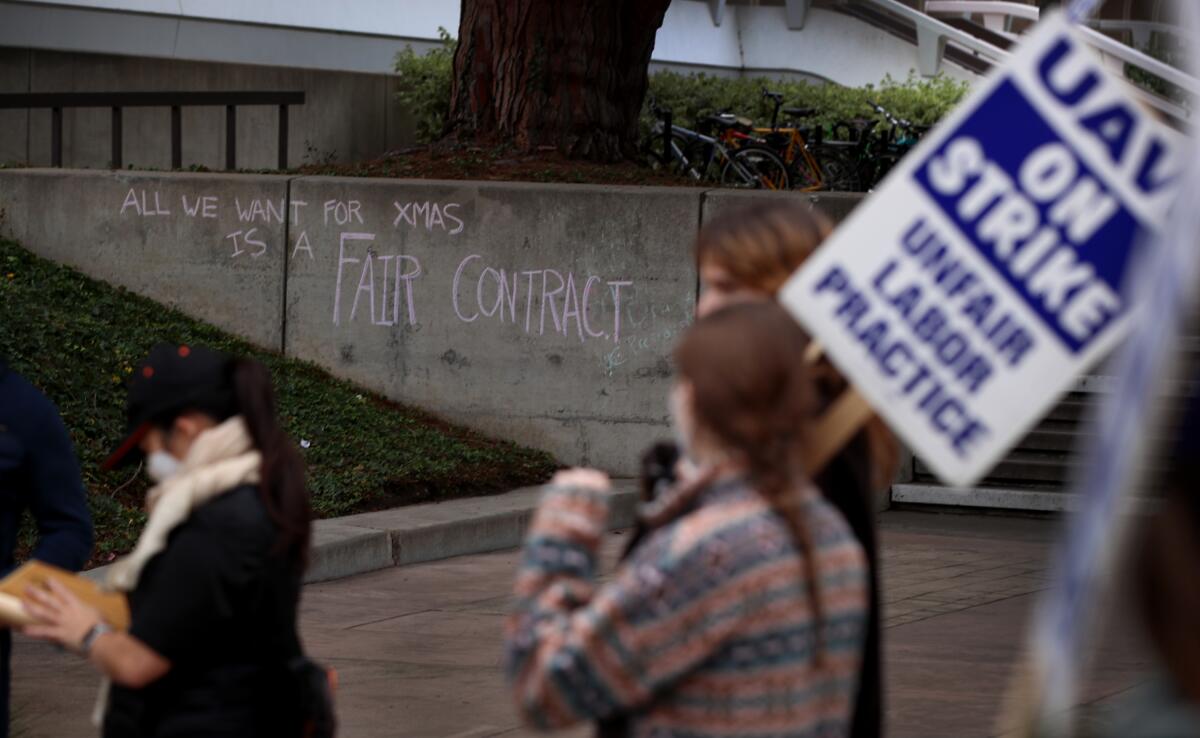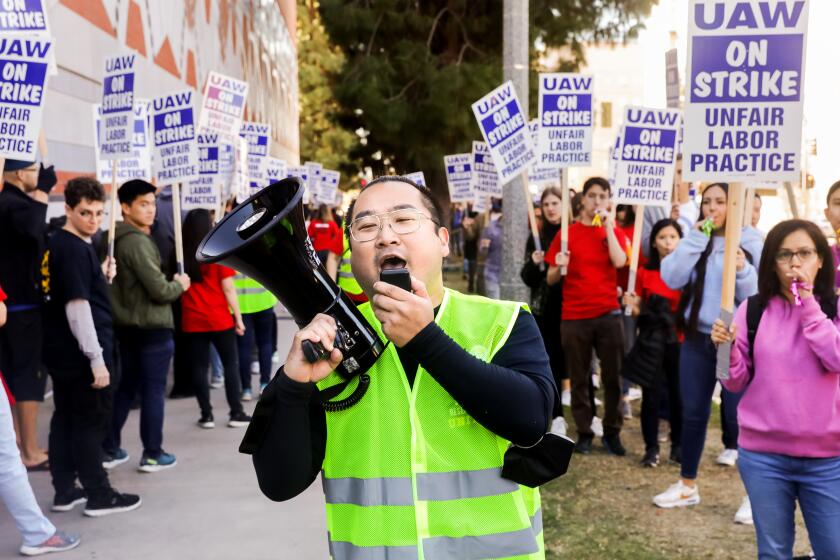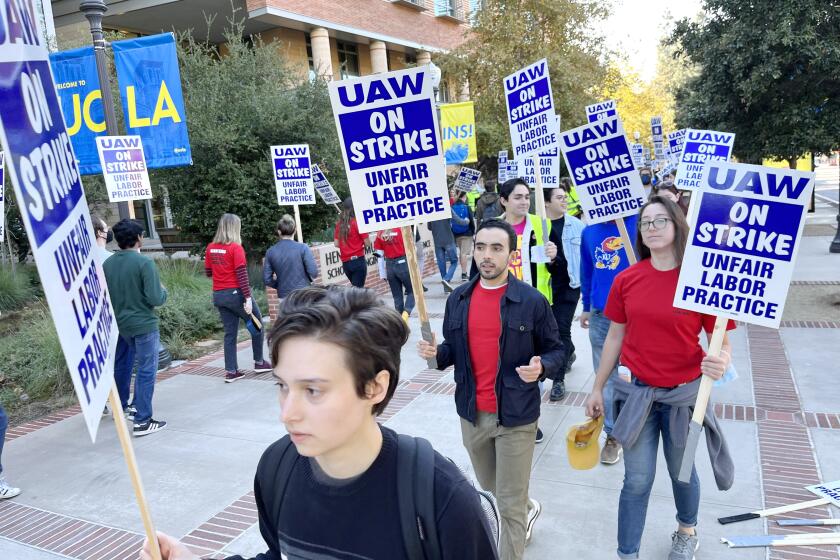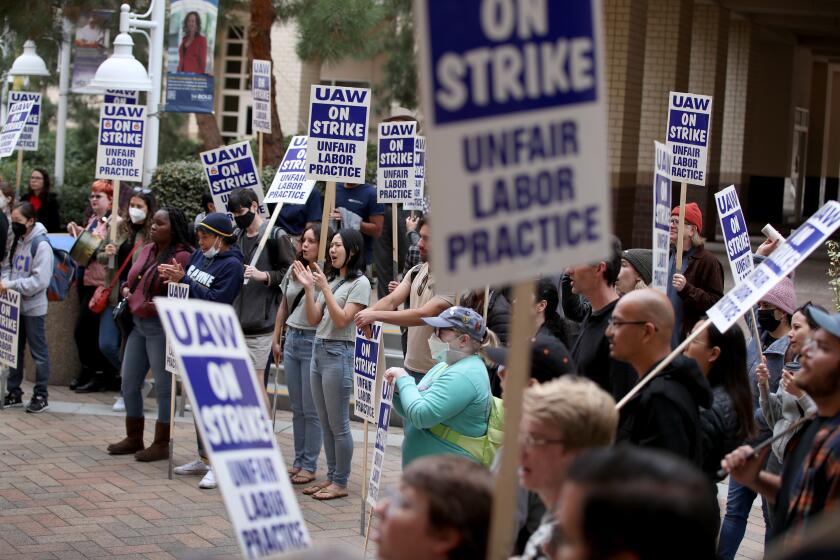UC and striking academic workers agree to mediation amid standoff over wages

The University of California and the union representing tens of thousands of its striking academic workers agreed Friday to ask an independent mediator to intervene in stalled contract negotiations, hoping to reach an agreement to end the month-long walkout that has forced much tumult across the 10-campus system.
UC administrators have for weeks urged 36,000 academic workers represented by the United Auto Workers to enter into voluntary mediation, in which a neutral party would help the two sides resolve ongoing disputes. Bargaining team members voted to move forward with it one day after UC administrators told the union that they would not make any new proposals during negotiations, according to union leaders.
The massive walkout â the nationâs largest ever strike of higher-education academic workers â reached a critical point this week during finals when widespread disruption unfolded throughout the system. Exams were scaled back, study sessions canceled, papers left unread. Faculty â some honoring the pickets and others unable to handle the load alone â are withholding about at least 34,000 grades across the system.
Also on Friday, two smaller bargaining units representing 12,000 postdoctoral scholars and academic researchers overwhelmingly approved a new contract with UC that elevates their pay to among the highest in the nation for such workers.
UC leaders said they are pleased the remaining two bargaining units â which represent the vast majority of striking workers â have agreed to mediation.
âWe remain committed to securing a fair and reasonable contract with the union that honors the hard work of our valued graduate student employees,â said Letitia Silas, executive director of systemwide labor relations. âWith the help of a neutral mediator, we hope to secure that agreement quickly.â
Rafael Jaime, the president of UAW Local 2865, which represents about 19,000 of the academic student employees, said that while the unions didnât want to work with a third-party mediator at the beginning of the strike, it now makes sense. He said they are still far from reaching an agreement on compensation and international student tuition.
âWeâve reached a very difficult period,â Jaime said, noting that itâs become time to âuse all the tools at our disposal.â
About 48,000 unionized academic workers across the University of Californiaâs 10 campuses walked off the job, calling for better pay and benefits.
âWeâre still going to be fighting for the issues that are important to our members; that will remain the same,â Jaime said. âBut weâre hoping this will be helpful in reaching a fair agreement.â
Both sides will meet to hammer out details about the mediation process, and must agree on a mediator and a timeline. If UC and UAW do not reach an agreement at the end of the process, the parties would return to the bargaining table or file for impasse, in which the Public Employee Relations Board would appoint its own mediator.
âOur goal has always been to make UC a more just, equitable place to work,â said Tarini Hardikar, a student researcher at UC Berkeley who sits on the bargaining team. âWe look forward to working with a professional mediator to resolve the issues still on the table. Until then, we remain on strike.â
Harry Bendekgey, who represents UC Irvine student researchers in bargaining, said he voted Friday in favor of moving forward with a mediator.
âI think a mediator is going to be helpful for forcing serious offers,â said Bendekgey, who is a doctoral candidate in the computer science department.
He said he knows itâs been a tough four weeks for many, but noted the progress already made in contract negotiations, including paid parental leave and transit subsidies. And while a mediator could help in salary discussions, he thinks the pressure from the ongoing strike and strength of their movement will have the largest effect on compensation.
âThe wages we win in this contract will not be decided by a mediator ... but by our workersâ commitment to striking,â Bendekgey said. He and many other strikers on the picket line Friday said they remain committed to the effort, but there have been growing concerns about the possibility of the strike stretching into the next term.
The latest UC proposal offered to boost pay for workers by 12.6% or higher starting October 1, 2023. For a first-year teaching assistant, that would amount to $28,992 annually. In fall 2024, base pay would increase, ranging from $29,000 to $36,000 for academic student employees, and $33,500 to $48,500 for graduate student researchers.
In a statement, UC said most workers would receive an average three-year salary increase of 26%, on top of increases based on experience.
Tying workersâ pay to their housing costs could have âoverwhelming financial impacts,â for UC. a system provost warns amid strike.
The proposal still falls short of the $43,000 minimum salary for all graduate student workers that the union is seeking, down from the $54,000 it initially proposed.
Jaime said members do not feel UCâs current proposal is enough.
âIt still falls woefully short of what members actually need in order to address the cost of living crisis that we all experience,â Jaime said. âWe would like to see more movement from them toward us.â
Deryn LeDuke, a doctoral candidate in biomedical sciences at UC San Diego, said she attended a town hall early Friday about the mediation option, and was glad the union agreed to involve a third party.
She said she thinks an arbitrator will help push UC in a more equitable direction, and sooner. She worried that getting forced into mediation after an impasse could lead to further delays, which means more time spent away from the experiments she runs as a full-time researcher.
The mice she uses in behavioral neuroscience experiments have already outgrown their prime window for study, meaning results she hoped to have in January will likely not be complete until May. She will likely have to start over with a new cohort of mice.
Despite the time away from her work, she remains committed to the strike.
In its fourth week, the massive academic workers strike has led to canceled finals, delayed grades and growing angst among students.
âI feel like I have a responsibility to my research, but I also have a responsibility to all of these ⌠grad students,â LeDuke said.
On Nov. 28, UC reached a tentative agreement with postdoctoral scholars and academic researchers, who belong to two smaller UAW bargaining units.
On Friday, after postdoctoral scholars and academic researchers in UAW Local 5810 approved their agreement, leaders announced on Twitter: âWE HAVE NEW CONTRACTS!â
The pact raises the minimum annual pay for their full-time positions from about $55,000 to $70,000 or higher with various adjustments by the end of the five-year contract â including a $12,000 raise by next October.
âThis resounding vote in favor of ratification sends a clear message that Postdocs are excited about this new agreement, and to be setting the standard for Postdocs across the country. Tens of thousands of UC Academic Workers have put it all on the line to create a stronger, more equitable UC, and we could not be prouder of all weâve achieved together so far,â said Jade Moore, a postdoctoral scholar at UC San Francisco in the Radiation Oncology Department and a member of the Postdoc Bargaining Team.
The workers will no longer be on strike following the ratification and can return to work on Monday.
That accord does not apply to the 36,000 workers in UAW 2865, which represents graduate teaching assistants, tutors and instructors, and SRU-UAW, which represents student researchers, who will continue to strike as negotiations enter a new phase with a mediator.
More to Read
Sign up for Essential California
The most important California stories and recommendations in your inbox every morning.
You may occasionally receive promotional content from the Los Angeles Times.















